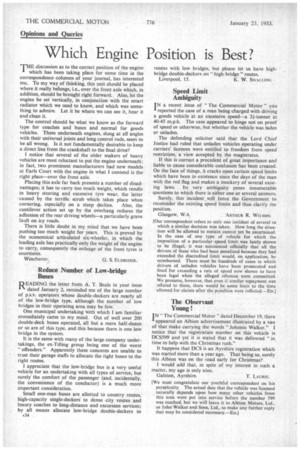Position is Best?
Page 44

If you've noticed an error in this article please click here to report it so we can fix it.
routes with low bridges, but please let us have highbridge double-deckers on " high-bridge " routes.
Liverpool, 15. K. W. SWALLOW.
Speed Limit Ambiguity
I N a recent issue of "The Commercial Motor" you reported the case of a man being charged with driving a goods vehicle at an excessive speed—a 21-tormer at 40-45 m.p.h. The case appeared to hinge not on proof of speed or otherwise, but whether the vehicle was laden or unladen.
The defending solicitor said that the Lord Chief Justice had ruled that unladen vehicles operating under carriers' licences were entitled to freedom from speed restriction, a view accepted by the magistrates.
If this is correct a precedent of great importance and liable to cause considerable confusion has been created. On the face of things, it cracks open certain speed limits which have been in existence since the days of the man with the red flag and makes a mockery of several existing laws. Its very ambiguity poses innumerable questions to which there is either one or several answers.
Surely, this incident will force the Government to reconsider the existing speed limits and thus clarify the position.
Glasgow, W.4. ARTHUR R. WILSON.
[Our correspondent refers_to only one incident of several -in which a similar decision was taken. How long the situation will be allowed to remain cannot yet be ascertained. In the case of one type of vehicle for which the imposition of a particular speed limit was lately shown to be illegal, it was. announced officially that all the drivers of these who had been penalized because they had exceeded the discredited limit would, on application, be reimbursed. There must be hundreds of cases in which drivers of unladen vehicles have been prosecuted and fined for exceeding a rate of speed now shown to have been legal when the alleged offences were committed. We presume, however, that even if similar repayment was offered to them, there would be some limit to the time allowed for claims after the penalties were inflicted.—E.]
























































































































































